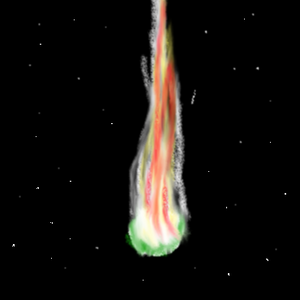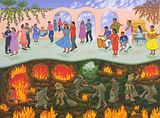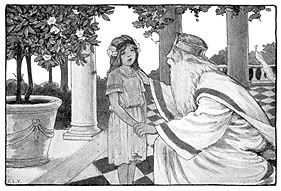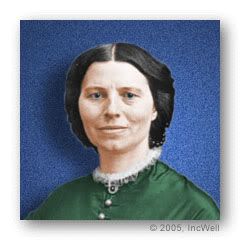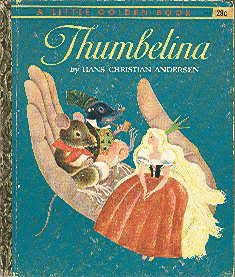
Little Thumbelina Once upon a time there was a little girl no bigger than her Mother’s thumb, and so they called her “Thumbelina.”
Thumbelina did not sleep in a little white bed, as you do; her bed was half of a walnut shell. Her Mother covered her with pink rose leaves for blankets when she curled up for a cozy nap.
By and by, when Thumbelina had grown large enough to run about wherever she wished to go, she started for a walk one beautiful sunshiny morning. She had not gone very far when she heard something coming hoppity-skip, hoppity-skip behind her. She turned around, and there she saw a great big green Grasshopper.
“How do you do, Thumbelina?” he said. “Wouldn’t you like to go for a ride this morning?”
“I should like it very much,” said Thumbelina.
“Very well, hop up on my back,” said the Grasshopper. So Thumbelina hopped up on his back, and away they went, hoppity-skip, hoppity-skip, through the grass. Thumbelina thought it was the finest ride she had ever had. After a while the Grasshopper stopped and let her get down off his back.
“Thank you, Mr. Grasshopper,” said Thumbelina. “It was very good of you to take me for a ride.”
“I’m glad you enjoyed it,” said the Grasshopper. “You may go again some day. Goodbye.” And away he went, hoppity-skip, hoppity-skip, through the grass, while Thumbelina went on her walk.
She walked on and on until she came to a river, and as she stood on the bank, looking down into the shining water, a Fish came swimming up.
“How do you do, Thumbelina?” he said.
“How do you do, Mr. Fish?” said Thumbelina.
“Wouldn’t you like to go for a sail this morning?” asked the Fish.
“Yes, indeed,” said Thumbelina, “but there is no boat.”
“Wait a moment,” said the Fish, and he flirted his tail, and darted away through the water. Presently he came swimming back to the bank, and in his mouth he held the stem of a lily leaf.
“Step down on this; it will make a fine boat.”
Thumbelina stepped down on the lily leaf and sat carefully in the middle of it. The Fish kept the stem in his mouth, and swam away down the stream. Overhead the birds were singing, along the bank the flowers were blooming, and over the edge of the leaf Thumbelina could see the fishes darting here and there through the water.
So they sailed and sailed down the river. But at last the Fish took her back to the bank again.
“Thank you for the sail, Mr. Fish,” Thumbelina said as she stepped off onto the bank. “I never had such a good time in all my life.”
“I’m glad you enjoyed it, Thumbelina. Goodbye for today.”
The Fish darted away through the water, and Thumbelina turned to go home. Just then Mrs. Mouse came running up.
“How do you do, Thumbelina?” she said. “Won’t you come home with me and see my babies?”
“I’d love to,” said Thumbelina, and she clapped her hands in glee.
Mrs. Mouse’s home was quite a way down under the ground. Thumbelina crept through the long dark passageway to the cozy room in which Mrs. Mouse and her three babies lived. They all ran races up and down the long passageway, and Thumbelina tasted the dried peas which Mrs. Mouse had brought home with her.
“I think I must go home now,” Thumbelina said at last. “My Mother will be wondering where I am.” So she said goodbye to them all and started off home.
She had not walked very far along the path through the field when she heard something saying, “Peep, peep” in a weak, sick little voice. Thumbelina looked, and there close beside her in the grass she saw a little Bird. His eyes were shut, and he looked very sick.
“Why, what’s the matter, little Bird?” said Thumbelina.
“Oh, I have a thorn in my foot, and it does hurt so.”
“Let me see,” said Thumbelina. “Perhaps I can help you.”
She looked carefully, and there she saw the thorn sticking in the poor Bird’s foot. She took her little fingers and pulled it out, as gently as she could. Then she fetched some clear, cold water and bathed the wounded foot. The Bird felt so much better that he opened his eyes.
“Why, it is Thumbelina!” he said.
“How did you know my name?” said Thumbelina, in surprise.
“That’s easy to explain,” said the Bird. “My nest is up in a tree, close beside your window. I often hear your Mother calling you. But are you not a long way from home?”
“Yes, I am,” said Thumbelina. “I was hurrying home when I found you.”
“Well,” said the Bird, “if you climb up on my back, I’ll take you there, far more quickly than you can run.” So Thumbelina climbed up on the Birdie’s back.
“Hold on tight,” he said, as he spread his wings and flew swiftly up about the treetops.
He went so high that sometimes they skimmed along through the clouds, and so fast that Thumbelina could hardly get her breath; but still she thought it was very wonderful, and she was not a bit afraid. Soon the Bird lit right in the window of Thumbelina’s own room. She climbed down off his back, and thanked him for bringing her home. Then she ran away to find her Mother, and tell her all about the wonderful things which had been happening to her that day.

